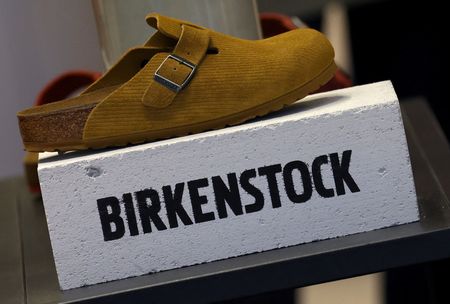By Helen Reid and Neil J Kanatt
(Reuters) -Birkenstock, famous for its cork-based sandals, reported strong sales over the Christmas holiday shopping season but stopped short of raising its earnings targets as executives struck a note of caution over tariffs and other economic risks.
“We have a very strong order book, but keep in mind that there’s a lot of macroeconomic uncertainty [on] interest rates, currency movements, tariffs,” CEO Oliver Reichert said on a call with analysts after the results on Thursday.
“The potential impact on the global economy and the global consumer is highly uncertain,” Reichert said.
Birkenstock shares fell 2% in early trading in New York.
Birkenstock, which makes most of its products in Germany, could be impacted by reciprocal tariffs threatened by U.S. President Donald Trump. The company did not give a U.S. sales figure, but the Americas region as a whole accounted for 58% of revenue in its fiscal first quarter ending December 31.
Birkenstock’s wholesale business — through which it sells at department stores and retailers such as Nordstrom and Footlocker — grew at a faster pace than sales at its own stores over the October-December quarter, hurting profitability.
Its gross profit margin for the quarter was lower than a year earlier as wholesale revenue jumped 30% to 182 million euros while direct sales to customers rose 11% to 178.5 million euros.
“Once again, wholesale is ahead, while direct-to-consumer is trailing, which makes us continue to question the path to direct-to-customer transition,” said Bernstein analyst Luca Solca.
As Birkenstock works to broaden its appeal beyond sandals, it said clogs and boots accounted for nearly two-thirds of its quarterly revenue in the Americas region, and more than half in the Europe, Middle East and Africa (EMEA) region.
The company maintained its 2025 revenue growth target of 15% to 17% and its annual adjusted earnings before interest, taxes, depreciation and amortization (EBITDA) margin forecast of 30.8% to 31.3%.
BMO Capital Market analyst Simeon Siegel said that “in terms of the guide, I think it is important to acknowledge how early we are in the year and prudence could simply be a function of conservatism.”
Birkenstock’s first-quarter revenue of 361.7 million euros ($377.47 million) beat analysts’ estimates of 356.2 million euros, helped by full-price sales of its pricey footwear despite a competitive promotional environment during the holiday season, particularly in its biggest market, the United States.
Its adjusted earnings per share of 18 euros for the quarter also topped expectations by 2 euros, according to data compiled by LSEG.
($1 = 0.9582 euros)
(Reporting by Juveria Tabassum and Neil J Kanatt in Bengaluru and Helen Reid in London; Editing by Shinjini Ganguli and Susan Fenton)









